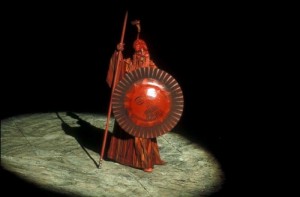In the false economy of war in the epic, human bodies are a commodity. Shakespeare, with Troilus and Cressida, reveals the grotesque and the mundane in the legend of the Trojan War. In the epic retellings of this ten year war, the world created is stagnant, without capitalism or production, without cultural exchange or growth. The Greeks remain camped outside the walls, and the Trojans within. Bodies become the only mediator of value, and are digested in various ways.
To digest: to divide and dispose; to disperse; to classify; to prepare food in the stomach; to suppurate. Many ways of seeing the word can be read into the human economy of Troilus and Cressida. Continue reading


